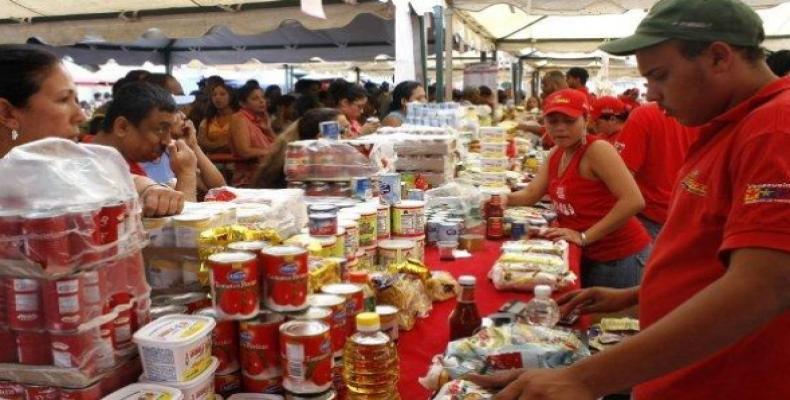Caracas, December 3 (teleSUR-RHC)-- A line has formed in front of the Mercal state supermarket in San Martin, Caracas. Ester Vergara has come prepared, reading a newspaper as she queues. She has been there for four hours having arrived at six in the morning, waiting for her turn to enter.
“It’s worth it on the one hand because if they let us in we buy our food. Because we buy according to our identification number, and if they don’t call mine I’ll have to come back next Wednesday,” she told teleSUR.
The long wait and complicated queuing system is due to widespread problems of food shortage in Venezuela. Between massive inflation, slow production, and private companies deliberately withholding items, day-to-day items like eggs, meat, milk and flour become difficult to get hold of, and astronomically expensive.
But at Mercal, shelves are well-stocked with hard-to-get products, and sold at fair prices. Frank Amaya works with the People’s Council of Supply and Production, which makes sure that each Mercal gets the stocks that it needs. He told teleSUR that the San Martin Mercal serves 500 people each day, 250 of whom are elderly, disabled, or pregnant women. Many are from the poorest sectors of society.
The Venezuelan government introduced the Mercal network in 2003 and there are now more than 16,600 nationwide, plus mobile markets that travel between neighborhoods. Specific items are not always guaranteed—the San Martin branch was awaiting a delivery of eggs, one of the items most scarce and in demand in Venezuela—but low prices are. Mercal’s website sets out the cost of various items: rice at 25 Bolivares a kilo, pasta at 15 and beef at 255 bolivares a gram.
It is difficult to give these prices in dollars as the exchange rate varies from the official rate around six Bolivares to the dollar, and the black market parallel exchange rate, which is around 720. But, as a comparison, packs of pasta in regular supermarkets are sold for over 1,000 Bolivares.
“There are established regulated prices and there are subsidized prices,” Amaya explained. “Subsidized by the central government. This was implemented by Comandante Hugo Chavez. The legacy is continued by the president, Nicolas Maduro.”
In spite of the queues, people finishing their shopping said that it was worth the wait. Gloria Marine emerged with two bulging bags of meat, ham, black beans, rice, and butter.
“Because it’s more economical, and because you get things. We get up early and everything, we sacrifice ourselves because you get what you want, it’s the only way. And because this one here is really organized,” she said.
Juliana Salazar bought 9.5 kilos of ham for 4,000 Bolivares.
“In other places I couldn’t buy this, obviously, never, never, never. Imagine with the economic war that we have, with toilet paper, imagine they’ll never sell you ham. And at this price, it seems that to do anything else is impossible, you know?”
One issue that the Mercal struggles with is what in Venezuela is known as bachaqueo: people who buy the food at subsidized prices to sell on for a profit. According to Amaya, grassroots government supporters work alongside the police to identify and prosecute bachaqueros.
“Because there are people who have to wait here until three in the morning to be served,” he said.
The situation is frustrating and though Venezuelans do not go hungry, there is an emotional toll.
“It’s a tough situation where the people are feeling an enormous pressure, because really salaries don’t reach, people have to make long queues, people are in permanent stress, this is undeniable,” economist Tony Boza told teleSUR.
“The economic war simply is a historic mechanism used in this situation to dynamize speculation to be used as a political weapon.”


